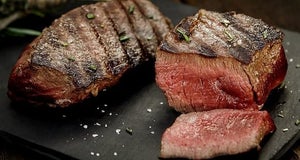
Written by Jack Boardman
Ratio 1:3
By now you should know the Myprotein motto: Fuel Your Ambition. Before and after a killer workout, you need to make sure that your body gets the fuel that it needs to match your health and fitness goals.
This is more specific than you might have realised. As a rule, many experts recommend a 1:3 protein to carbs nutrition regimen to make sure you get what you need. But what’s the logic behind that, and how can you ensure that you get yours.

To begin, fuelling before exercise and refuelling after are integral in seeing that your metabolism works as it should, that your muscles get the energy they need to strengthen and develop, and that you recover from the strain you put on your body. Fuelling helps to optimise your performance in burning fat and increasing muscle mass. If you don’t get the right fuel it’s like putting diesel in a petrol engine and can ultimately have a negative effect on your training – no matter how positive your efforts and intentions are.
You’ll have been aware of the 1:3 ratio with dinner servings of meat and two or three vegetables, with the meat providing your protein and veg supplying your energy reserves. This ratio is most effective for glycogen resynthesis. It takes about 90 minutes of low-intensity exercise to deplete glycogen stores, according to Iowa State University. These reserves are converted into energy which powers your muscles, and later help in recovery. Without, you are running on empty.
During exercise, an increase in your body’s release of catabolic hormones cause muscles and protein stores to breakdown. This is why you need to ensure you have the necessary protein in your system to work out effectively – for bodybuilders, an excess is required.

Carbohydrates maintain blood glucose levels during exercise and replace muscle glycogen. Low blood sugar, or hypoglycaemia, is common when people work out without enough carbs. The thing with carbs is ratio and timing. Too much too near to your workout can result in bloatedness and nausea. Your muscles rely on fast-burning carbs for fuel. Carbs delay fatigue and are utilised for protein to help with your endurance.
For carbs, 6 to 10 grams per kilogram of body weight is advised for strength training, and 4 to 2.0 grams of protein per kilogram of your body weight. This does not factor in fat and hydration, which are also integral in recovery and strength building.
You can get the protein and carbs you need, as mentioned in a 1:3 balanced diet as a general rule, and it needn’t be meat and veg. As well as chicken and fish, green beans, yoghurt, berries, eggs, cheese, nuts and fruits are high in the fuel that you need.

This is also where protein bars and shakes come in. Protein blends and formulas combine the mix of carbs, protein and other vitamins and nutrients to suit the intensity and aims of your workouts (that ambition we mentioned). Your body will absorb protein shakes quicker than you can prepare and digest food and get your 1:3 in straight after your workout is important.
Our advice: don’t replace meals, but have a shake on hand when exercising so that you replenish your energy levels before you make your way home.
Our articles should be used for informational and educational purposes only and are not intended to be taken as medical advice. If you're concerned, consult a health professional before taking dietary supplements or introducing any major changes to your diet.








